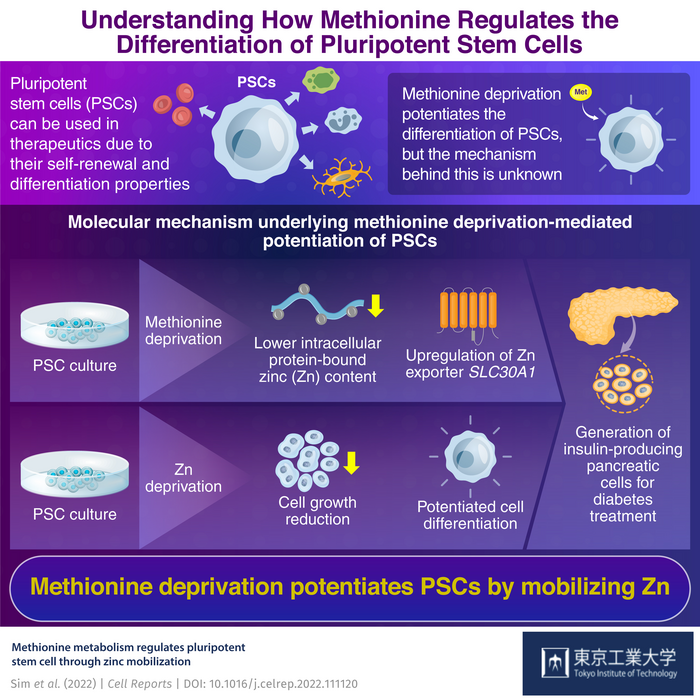Differentiation of pluripotent stem cells (PSCs) is regulated through a methionine-mediated mechanism, which has now been pinpointed by Tokyo Tech researchers. They have revealed that zinc (Zn) plays a crucial role in PSC potentiation. They used these insights to design a protocol to convert PSCs into insulin-producing pancreatic β cells—a high-potential diabetes therapy.

Credit: Prof. Shoen Kume from Tokyo Institute of Technology
Differentiation of pluripotent stem cells (PSCs) is regulated through a methionine-mediated mechanism, which has now been pinpointed by Tokyo Tech researchers. They have revealed that zinc (Zn) plays a crucial role in PSC potentiation. They used these insights to design a protocol to convert PSCs into insulin-producing pancreatic β cells—a high-potential diabetes therapy.
Stem cell research has gained a lot of attention in the world of medical therapeutics. Pluripotent stem cells (PSCs) can self-renew and transform into different types of cells in the body via a process called differentiation. These cells have manifold applications, such as disease modeling, drug discovery, and cell replacement therapy.
One area of focus in PSC research is diabetes treatments. A common characteristic of diabetes is having ineffective or overworked pancreatic β cells—cells that produce insulin. Controlling the differentiation of PSCs to produce β cells is one of the major goals of research in the field. Previous studies have shown that methionine, an amino acid, plays a major role in the differentiation of PSCs. But the precise mechanism behind this has been, thus far, unknown.
To find the missing piece of this puzzle, a team of researchers from Japan, led by Prof. Shoen Kume from Tokyo Institute of Technology (Tokyo Tech), delved deeper into the methionine-mediated regulation of PSC pluripotency. In a recent study published in Cell Reports, the researchers revealed that cellular zinc (Zn) content played a crucial role in stem cell differentiation. Prof. Kume explains, “Earlier research in the area has shown that if we culture PSCs in a medium which is deficient in methionine, it leads to a reduction in intracellular S-adenosyl methionine or SAM, which renders PSCs in a state of potentiated differentiation. But our study further identified that zinc (Zn) is a downstream target of methionine metabolism and it can potentiate pluripotency in undifferentiated PSCs.”
In this study, the research team first cultured PSCs in a methionine-deprived environment. They found that methionine-deprivation not only reduced the intracellular protein-bound Zn levels in cells, but that it also upregulated SLC30A1, a gene that produces an important Zn transport protein.
The team then cultured hiPSCs under low Zn concentrations. They discovered that a Zn-deprived medium partially mimicked methionine deprivation and led to a decrease in cell growth and an increase in potentiated differentiation. They also found that the Zn deprived state also altered the methionine metabolism profile and eliminated undifferentiated hiPSCs. These results indicated that methionine deprivation-induced differentiation takes place by lowering the Zn content in cells.
Using the insights, the team then developed a methodology for generating insulin-producing pancreatic β cells. “β cell transplantation is a promising treatment for diabetes, but there is a paucity of donor cells for the treatment, as well as immune-related complications that can arise from this treatment. Using PSCs to produce genetically-matching β cells is a way to overcome this,” explains Prof. Kume.
These findings indicate a link between Zn mobilization and methionine-induced potentiation of PSCs and provide clear a direction for future research in the field of stem cell therapies.
###
Related Information
Today’s Stem Cell Special: Small Intestine on a Plate! https://www.titech.ac.jp/english/news/2021/048927
A Ferry Protein in the Pancreas Protects It from the Stress Induced by a High-Fat Diet | Tokyo Tech News https://www.titech.ac.jp/english/news/2020/047867.html
Move over Akita: Introducing ‘Kuma Mutant’ Mice for Islet Transplantation Research https://www.titech.ac.jp/english/news/2020/047462
Shoen Kume – Towards a new therapy for diabetes – Regenerating pancreas from ES and iPS cells https://www.titech.ac.jp/english/public-relations/research/stories/faces37-kume
Kume &Shiraki Lab. http://www.stem.bio.titech.ac.jp/index.html
About Tokyo Institute of Technology
Tokyo Tech stands at the forefront of research and higher education as the leading university for science and technology in Japan. Tokyo Tech researchers excel in fields ranging from materials science to biology, computer science, and physics. Founded in 1881, Tokyo Tech hosts over 10,000 undergraduate and graduate students per year, who develop into scientific leaders and some of the most sought-after engineers in the industry. Embodying the Japanese philosophy of “monotsukuri,” meaning “technical ingenuity and innovation,” the Tokyo Tech community strives to contribute to society through high-impact research.
https://www.titech.ac.jp/english/
Journal
Cell Reports
DOI
10.1016/j.celrep.2022.111120
Method of Research
Experimental study
Subject of Research
Cells
Article Title
Methionine metabolism regulates pluripotent stem cell pluripotency and differentiation through zinc mobilization
Article Publication Date
19-Jul-2022




